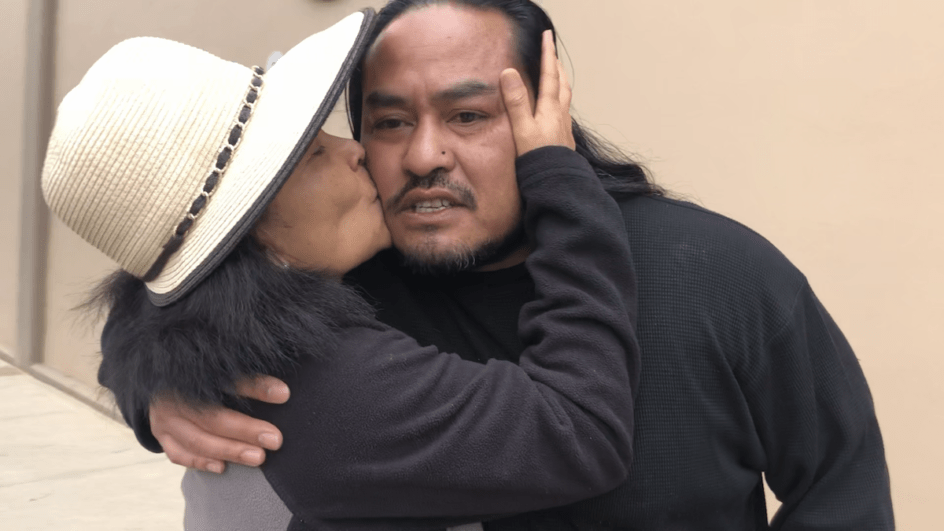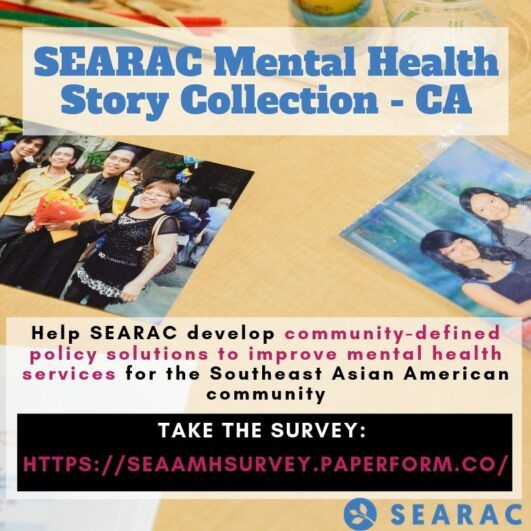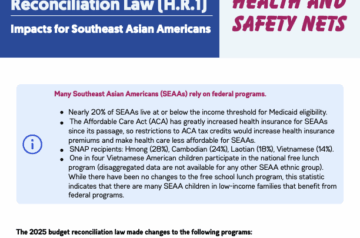After fleeing war-torn countries, Southeast Asian refugees were resettled in some of the United States’ most impoverished neighborhoods and received insufficient support upon initial resettlement. As refugees of war who have experienced genocide, guerilla warfare, losing loved ones, and displacement, Southeast Asian Americans (SEAAs) experience higher rates of mental health conditions compared to the general population.12 As a result of not receiving proper resettlement support and access to mental health services, many young refugees who were left to navigate systems of oppression, the pressure of assimilation, and bullying, often turned to drugs, gangs, and violence to survive.
In recent years, US Immigration and Customs Enforcement (ICE) has escalated detainments and deportations of Southeast Asian Americans with decades-old convictions who have already served their sentences and have moved on to turn their lives around. Inhumane immigration policies further punish SEAA refugees for not having proper access to culturally and linguistically competent mental health services. These policies tear families apart, perpetuate the cycle of trauma, and expand disparities in mental health for the SEAA community.
Mental Health Awareness Spotlight

“After talking to someone about everything I am going through as a mother whose son is in deportation proceedings, I feel a little more relief. This burden doesn’t feel as heavy. I don’t know what is going to happen to him, but I don’t feel alone.” – Elizabeth Chan, Oakland, CA
The Center for Empowering Refugees and Immigrants (CERI) is one of few organizations in Oakland, CA, that work with Cambodian refugees and immigrants to provide an array of holistic culturally and linguistically mental health services. Due to the increased detention and deportation of SEAA refugees, CERI serves many community members whose families include a loved one under threat of deportation.
In response to the March 2019 ICE raid that affected several members of the CERI community, CERI created space to offer individual and group support for the impacted families. Elizabeth Chan is a survivor of the Cambodian genocide and came to the United States as a refugee in 1981, resettling in Oakland, CA. ICE agents arrested her son, Kouen “TJ” Hem, on March 13, leaving Elizabeth to endure yet another traumatic life-altering experience. She bravely shares:
“This is a very difficult time for me as a mother. Mona, [CERI] executive director, is very caring and welcoming. She makes me feel comfortable talking to her. I am able to tell her my story and about my son’s situation, and it helps to not have to hold it all myself. After talking to someone about everything I am going through as a mother whose son is in deportation proceedings, I feel a little more relief. This burden doesn’t feel as heavy. I don’t know what is going to happen to him, but I don’t feel alone. If I didn’t have CERI, I would be more worried or depressed or stressed. I wouldn’t know what to do or how to deal with all the emotions I’m going through.”
Recently, TJ’s case got reopened, allowing TJ to reunite with his family. Elizabeth’s family received a call on May 15 and left immediately that night for Bakersfield to bring TJ back home to Oakland.
Culturally and linguistically competent mental health services are lifesaving, but mental health services in California have not been doing enough to serve our SEAA community.
TAKE ACTION: Support our sponsored mental health CA bill by telling us your mental health story
SEARAC is excited to launch our SEARAC Mental Health Story Collection – California campaign to identify gaps in mental health services and help develop community-defined policy solutions for the SEAA community.
Contribute your story today on the mental health needs of the Southeast Asian American community and help us advocate for the urgent need for culturally and linguistic competent mental health services!
Your story will also help convey to California state legislators why they should support Assembly Bill 512: Cultural Competence in Mental Health and will be used to inform a larger statewide #Care4MyCulture campaign, which seeks to improve cultural competence in California’s mental health delivery system.




